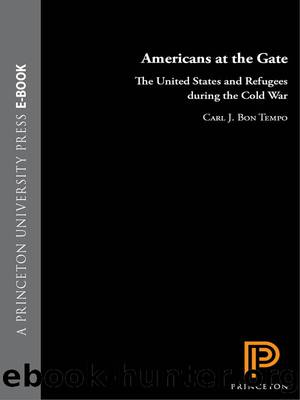Americans at the Gate by Carl J. Bon Tempo

Author:Carl J. Bon Tempo
Language: eng
Format: epub
Publisher: Princeton University Press
Published: 2013-01-15T00:00:00+00:00
HUMAN RIGHTS AND REFUGEES: SOVIET JEWS AND CHILEANS
The two most prominent refugee crises of the early 1970sâJews fleeing the Soviet Union and Chileans hoping to escape the Pinochet governmentâillustrate the ascendancy of human rights concerns in refugee affairs. In the 1960s and 1970s, the Kremlin toughened its long-standing policies restricting the rights of Jews to emigrate. The Soviet government denied departure to so many Jewsâand so many others were discriminated against by other Soviet citizens just for wanting to leaveâthat they earned their own moniker, the refuseniks. American Jewsâwell organized in a variety of interest groups, growing in political power, and increasingly concerned about maintaining Jewish identityâdeemed such discrimination unacceptable and worked tirelessly to expose it and push for change. Moreover, because Jews were a key part of the Democratic partyâs electoral coalition, they instantly gained the attention of certain politicians and policymakers. Though their protests had little political impact in the late 1960s, by the early 1970s, a growing number of politicians from across the ideological and partisan spectrum picked up the cause. Jewish groups and their political allies urged the Nixon administration to forcefully pressure the Soviets to ease Jewish emigration and to facilitate entry of the refuseniks to the United States. Democratic representative Ed Koch stated in 1971 that the United States âshould extend the same kind of humanitarian compassion and opportunity to these Jewsâ as it did for Hungarians and Cubans in previous decades, revealing that the Jewish emigration issue was conceived as a refugee problem. The Nixon administration instead utilized quiet diplomacy to encourage the Soviet Union to relax its emigration stance, a tactic that may have contributed to the Soviet decision in 1972 to allow 35,000 Jews to depart. But the Administrationâs efforts were muted; it clearly wanted to avoid risking its carefully crafted détente with the Soviets by publicly getting behind Jewish emigration.11
Discreet diplomacy became more difficult to pursue in late 1972 after the Soviets imposed further restrictions on Jewish emigration. Senator Henry âScoopâ Jackson, a conservative Democrat from Washington with an eye on a 1976 presidential run, responded by attempting to link Soviet emigration policies to pending legislation that formally embodied the trade agreements reached at the May 1972 American-Soviet summit. Specifically, Jackson crafted an amendment that tied Soviet access to American trade credits to the liberalization of the Soviet Unionâs emigration policies. If Jackson had his way, neither the Soviets nor Nixon would get their trade agreement unless the Kremlin allowed Jews to emigrate. Jacksonâs gambit quickly picked up major congressional supportâand equal amounts of disdain from the Nixon administration. In 1973 the trade bill, complete with Jacksonâs amendment, passed the House by overwhelming numbers, forcing both the Soviets and the Nixon White House to accommodate the senator. In 1974 Jackson, the Nixon (and then Ford) administrations, and the Soviet government engaged in complex negotiations that resulted in the Soviet Unionâs offering a general endorsement of its citizensâ right to emigrate. Jackson boisterously declared victory and announced that sixty thousand Jews
Download
This site does not store any files on its server. We only index and link to content provided by other sites. Please contact the content providers to delete copyright contents if any and email us, we'll remove relevant links or contents immediately.
| Antitrust | Civil Law |
| Emigration & Immigration | Federal Jurisdiction |
| Housing & Urban Development | Indigenous Peoples |
| Land Use | Public |
| Public Contract | Public Utilities |
| Urban, State & Local Government |
Killers of the Flower Moon by David Grann(3272)
Machine Learning at Scale with H2O by Gregory Keys | David Whiting(2338)
Will by Will Smith(2087)
Guns, Germs and Steel by Diamond Jared(1896)
Borders by unknow(1795)
The Room Where It Happened by John Bolton;(1726)
The Color of Law by Richard Rothstein(1581)
Once Upon a Broken Heart by Stephanie Garber(1536)
Water Rights and the Environment in the United States by John Burch(1418)
Friends, Lovers, and the Big Terrible Thing by Matthew Perry(1360)
Examples & Explanations: Administrative Law by William F. Funk & Richard H. Seamon(1336)
A Short History of War by Jeremy Black(1314)
The Strength In Our Scars by Bianca Sparacino(1299)
HBR's 10 Must Reads 2022 by Harvard Business Review(1268)
Pharmacy Practice and The Law by Richard Abood(1260)
That Every Man Be Armed by Stephen P. Halbrook(1246)
The Guarded Gate by Daniel Okrent(1229)
515945210 by Unknown(1221)
Injustices by Ian Millhiser(1206)
